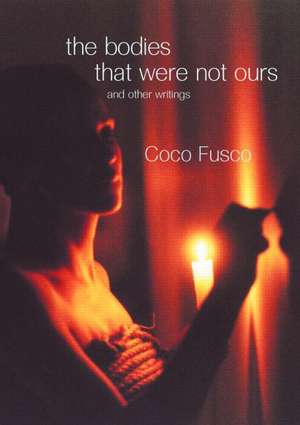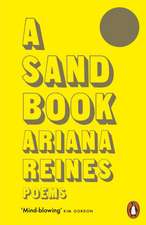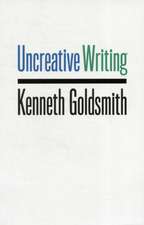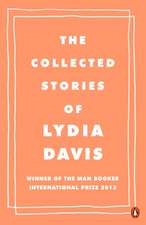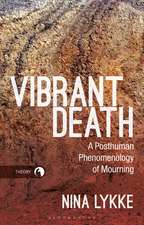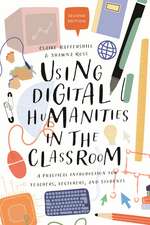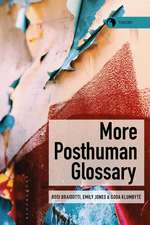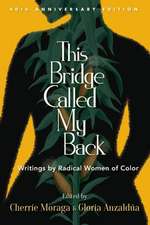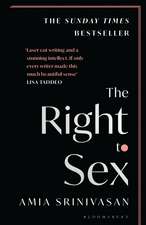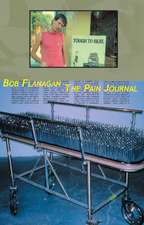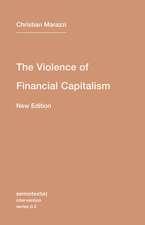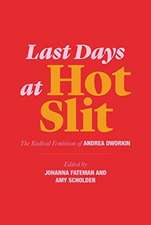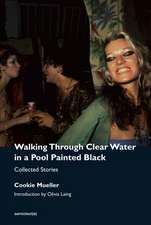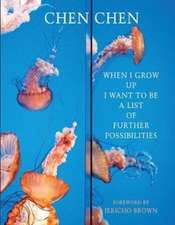The Bodies That Were Not Ours: And Other Writings
Autor Coco Fuscoen Limba Engleză Paperback – 18 oct 2001
Engaging and provocative, these essays, interviews, performance scripts and fotonovelas take readers on a tour of our current multicultural landscape. Fusco explores such issues as sex tourism in Cuba as a barometer of the island's entry into the global economy, Frantz Fanon's theorization of metropolitan blackness, and artistic and net activist responses to the effects of free trade on the Mexican populace. She interviews such postcolonial personnae as Isaac Julien, Hilton Als and Tracey Moffatt. Approaching the dynamics of cultural fusion from many angles, Fusco's satires, commentaries, and sociological inquiries collapse boundaries, and form a sustained meditation on how the forces of globalization impact upon the making of art.
| Toate formatele și edițiile | Preț | Express |
|---|---|---|
| Paperback (1) | 253.74 lei 6-8 săpt. | |
| Taylor & Francis – 18 oct 2001 | 253.74 lei 6-8 săpt. | |
| Hardback (1) | 764.03 lei 6-8 săpt. | |
| Taylor & Francis – 25 oct 2001 | 764.03 lei 6-8 săpt. |
Preț: 253.74 lei
Preț vechi: 341.42 lei
-26% Nou
48.56€ • 51.07$ • 40.57£
Carte tipărită la comandă
Livrare economică 09-23 ianuarie 25
Specificații
ISBN-10: 0415251745
Pagini: 272
Dimensiuni: 174 x 246 x 13 mm
Greutate: 0.53 kg
Ediția:New.
Editura: Taylor & Francis
Colecția Routledge
Locul publicării:Oxford, United Kingdom
Public țintă
Postgraduate and UndergraduateNotă biografică
Coco Fusco is the author of English is Broken Here: Notes on Cultural Fusion in the Americas (1995) and the editor of Corpus Delecti: Performance Art of the Americas (1999). She is an associate professor at the Tyler School of Art of Temple University.
Recenzii
'Fusco is a fine journalist.' - Nka
'It is rare that one will discover such a global thinker such as Coco Fusco whose vision manages to encompass issues within contemporary art ... with a conscience of history and power.' - Ezine
"Fusco is a fine journalist, patient, obsessive and skeptical. There is a probing relentlessness throughout the essay that is a recognisable signature, a distinctive tenacity that exemplifies the seriousness and singularity of Coco Fusco's ongoing project.."-Kodwo Eshun, NKA, Fall/Winter 2003 "Fusco, a consummate insider, positions herself as an outsider, someone alive to the endless war of position that is the contemporary art market. It is a stance exemplified in her prose style which is at one and the same time fank and combative, gossipy and malicious, historically minded and earnestly, even righteously pessimistic.."-Kodwo Eshun, NKA, Fall/Winter 2003 "It is rare that one finds such a global thinker such as Coco Fusco whose vision manages to encompass issues within contemporary art such as racial identity, performance, the black body and public space witha conscience of history and power...Fusco delivers within her texts a heavy research base and an intense undestanding of her homelands political crisis... Fusco's writings are meaty and rich...I found Fusco's writings and her work exciting and inspiring and in many ways a sentinel in regards to our own very passive conceptual civillity. The Bodies That Were Not Ours is itself a discourse within the language of contemporary art and a valuable collection of texts. -Christian Thompson, Fineartforum.org.""Provacative and elegant... Writing about ethnic and artistic identity with acute insight and obvious passion for her various mediums, Fusco nevertheless makes clear that the fusion of art and global politics hasn't come nearly as far as many cultural commentators would like to think."-Andi Zeisler, "Bitch: Feminist Response to Pop Culture, , Spring 2002 "Diverse bodies circulate in Coco Fusco's the bodies that were not ours. One of the most haunting bodies in this compelling collection of artists' writings is the figure of the corpse...makes for very interesting reading...I found myself utterly persuaded by Fusco's cogent arguments about the political stakes involved. Maria Wlash, Art and News."
Cuprins
Descriere
Interdisciplinary artist and writer Coco Fusco is one of North America's leading interpreters of intercultural theory and practice. This volume gathers together her finest writings since 1995 and includes critical essays by Jean Fisher and Caroline Vercoe that interpret her work.
Engaging and provocative, these essays, interviews, performance scripts and fotonovelas take readers on a tour of our current multicultural landscape. Fusco explores such issues as sex tourism in Cuba as a barometer of the island's entry into the global economy, Frantz Fanon's theorization of metropolitan blackness, and artistic and net activist responses to the effects of free trade on the Mexican populace. She interviews such postcolonial personnae as Isaac Julien, Hilton Als and Tracey Moffatt. Approaching the dynamics of cultural fusion from many angles, Fusco's satires, commentaries, and sociological inquiries collapse boundaries, and form a sustained meditation on how the forces of globalization impact upon the making of art.
